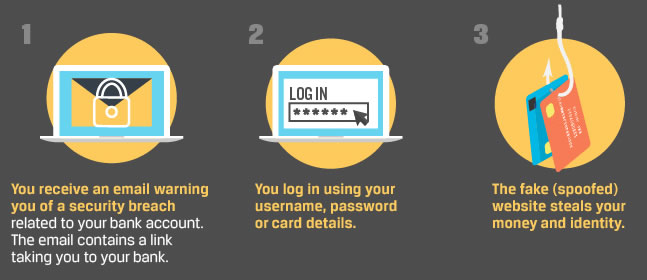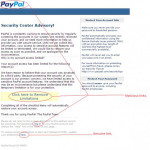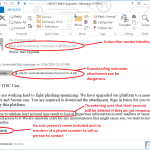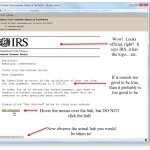
09 Jul Avoiding scams in daily life – Security Tips from EPG to You
This is the second installment of useful security tips to avoid being scammed online.
At Eagle Protective Group we care about our customers. We’re not just a service offering Dallas security guards and patrolling services; we want to help you protect you and your business in ways you might not think are dangerous.
This week EPG covers: “Spoofed” Banking Emails
What does Spoofing mean? The term ‘spoofing’ relates to pretending to be something that you aren’t. Nefarious types pray on the inattention of your email browsing to mistake their messages for legitimate ones that enter your inbox.
Thieves come in all shapes, sizes, just as they do in the real world where EPG patrols the streets, but they can also come from anywhere. From across the world, these criminals use computer terminals to create elaborate emails and websites that look and feel just like they belong to your Banking Institution, the IRS, Health Insurance, or other Company that holds sensitive material.
They’re so good in fact, sometimes, the links they show in the message are often REAL links from valid institutions. (They’re hoping you don’t click those, and want you to click the link/url they say you must click to right your account from being suspended or worse.
A quick overview on how it works:

But how can I tell the difference between a real email and a ‘spoofed’ one?
The first thing to remember is, if you receive a warning email from your bank or other warning letter telling you to login somewhere, you should contact the institution directly to verify the issue. This means using the phone numbers given to you when you opened the account, or visiting the website of the institution by typing the url out in your browser (again, NEVER CLICK on any link in these warning emails.)
Banks and other institutions rarely send out warnings like this unless you’ve personally set them up in your account to do so (overdraft protection, etc).
Warning signs to look for when inspecting the email:
- The email address where the message came from is suspicious. (e.g. customer-securityYOURBANKSNAME@int.uk.yourbanksname.com) If your bank legitimately wanted to email you, the address would be more like: info@yourbank.com.
- The email doesn’t address you by your name. (e.g. Dear Valued Customer)
- The linked URL within the message is incorrect. (e.g. yourbankname.somethingelse.com) Companies holding secure information like banks, rarely include links in their email that go to sensitive areas).
- The email is marked urgent. If you don’t take action now, your account will be suspended. A legitimate company would never threatn to close your account if you ignored an email.
- An attachment may be included to “fill out and send back”. NEVER click or open these attachments!
NEVER follow any link in an email from a company that holds secure information about yourself or your company. Always check in with that company directly by visiting their secure url by typing it into the browser directly.
We hope this useful tip has been helpful to you to help identify and delete potentially dangerous email messages from your inbox. Share this knowledge with family and friends, especially children and senior citizens who may be new to using computers. You knowledge could save them from being a victim.
Here are some visual example emails for you to look at to get more familiar with these spoofing or phishing style scams.
If you enjoyed and learned from these tips, call us today to see how Eagle Protective Group and the security guard services we offer can help your business stay on top, be secure, and grow with confidence. To visit our services page, please click this link: http://www.eagleprotectivegroup.com/services-html/
Eagle Protective group also provides:
security guards (Dallas, Mesquite)
security services (Dallas, Mesquite)
event security (Dallas, Mesquite)
vip protective services (Dallas, Mesquite)
Graphic courtesy of http://www.whoishostingthis.com/blog/




